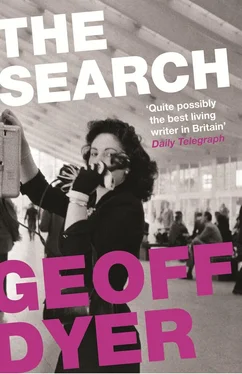Geoff Dyer - The Search
Здесь есть возможность читать онлайн «Geoff Dyer - The Search» весь текст электронной книги совершенно бесплатно (целиком полную версию без сокращений). В некоторых случаях можно слушать аудио, скачать через торрент в формате fb2 и присутствует краткое содержание. Год выпуска: 2013, Издательство: Canongate Books, Жанр: Современная проза, на английском языке. Описание произведения, (предисловие) а так же отзывы посетителей доступны на портале библиотеки ЛибКат.
- Название:The Search
- Автор:
- Издательство:Canongate Books
- Жанр:
- Год:2013
- ISBN:нет данных
- Рейтинг книги:3 / 5. Голосов: 1
-
Избранное:Добавить в избранное
- Отзывы:
-
Ваша оценка:
- 60
- 1
- 2
- 3
- 4
- 5
The Search: краткое содержание, описание и аннотация
Предлагаем к чтению аннотацию, описание, краткое содержание или предисловие (зависит от того, что написал сам автор книги «The Search»). Если вы не нашли необходимую информацию о книге — напишите в комментариях, мы постараемся отыскать её.
The Search — читать онлайн бесплатно полную книгу (весь текст) целиком
Ниже представлен текст книги, разбитый по страницам. Система сохранения места последней прочитанной страницы, позволяет с удобством читать онлайн бесплатно книгу «The Search», без необходимости каждый раз заново искать на чём Вы остановились. Поставьте закладку, и сможете в любой момент перейти на страницу, на которой закончили чтение.
Интервал:
Закладка:
‘No, no,’ said Walker smiling back, embarrassed. ‘Sorry, I was just looking. What’s it like?’
‘Boring as shit,’ the guy laughed before going back to his reading.
Walker sat back and shut his eyes. Opened them again briefly and looked out of the window. The usual stuff: clouds, trees, fields, power lines, sometimes a road. He slept and dreamed of a memory he had never had, of Rachel swimming in a pool and climbing out, smiling, her wet hair dripping. As she walked towards him he looked down at the trail of footprints stretching towards him from the blue pool, turning quickly to damp smudges and then dissolving away to nothing.
CHAPTER THIRTEEN
The train had stopped. The guy reading Fielding had gone and the compartment was empty. He glanced out of the window and saw the station name, Independence. Groggy with sleep, he pulled his bag from the luggage rack and stepped down to the platform.
The station was deserted. A clock showed the time as ten past four. Siesta shadows crept into the waiting room, empty except for an old man staring at the ground. The faded letters of a hoarding for a paint company said: ‘No colour loves the sun like yellow’. A station official was leaning out from a second-storey window, looking down the platform to where a woman was resting on a plinth-size suitcase.
Surprised by how quiet it was, Walker made his way down the worn steps leading out of the station. A man in a suit was halfway up, not moving, apparently pausing in midstride. As Walker made his way further down the stairs he saw that the man’s left leg was actually poised an inch from the step, exactly as if he were frozen while racing for a train. Out by the ticket hall a heavy black woman and two children were buying tickets. A newspaper vendor was pointing out into the streets, offering directions to a man in a trilby who echoed the gesture with a furled newspaper. An old man leant on his broom.
In the street the silence was even stranger, for the scene that met his eyes was ostensibly that of a busy city — except that here, too, nothing was moving. Cars were everywhere — about to pull out from the kerb, accelerating away from green lights. A tall man was awkwardly craning his neck as he folded himself into a taxi. Moving away from the station Walker looked up the incline of 3rd Avenue and saw an army of pedestrians swarming towards him, immobile, not moving even a fraction of an inch. He looked around, amazed at the detail of activity that normally passed unnoticed: coins falling from pale fingers to a beggar’s styrofoam cup. A labourer crouching at the knees to take the weight of a bag of cement which another man was tipping over the edge of a truck. Two men laughing together, one about to slap his knee with hilarity, the other leaning backwards, mouth open as if he had been shot. A woman gazing at herself in a small mirror, dabbing lipstick on to her mouth. A group of people clustered round a hot-dog stand, faces jutted forward to protect their shirts from the sauce that dripped almost to the ground. A smiling black girl reaching over to clean the windshield of a car waiting at the lights, the wipers flicked out like antennae, detergent bubbles foaming over the hood.
Walker moved between the cars, immobile but still animated by an inherent sense of speed, an invisible equivalent of the motion lines of a comic book, the slight ghosting of a photograph. He looked closely but could not see how this effect came about. With people it was easy — in every gesture you sensed the muscles straining in legs and arms — but cars looked exactly the same whether moving or stationary. Perhaps, since a car was designed to move, a sense of speed was implicit in the very idea of a car. A car in motion was simply a car; a car parked wasn’t a car, it was a parked car. Hence, thought Walker, smiling at the force and speed of his logic, the sense of momentum that animated the cars frozen in the street around him. He peered into the back window of a cab, one of the passengers pressed against the door, the other leaning heavily on him as the cab took a corner.
Frozen like this every gesture had a certain perfection, each moment of a person’s day — however insignificant — was worthy of the consideration you would give to a great work of art. More so in fact, for here every nuance of experience was revealed: over there a couple embracing, a woman handing coins to a flower vendor, her fingers almost touching his palm; people smiling and saying ‘please’ or waving ‘hello’; two people who had just bumped into each other, a look of startled apology spreading over their faces.
Walker had no idea what had happened — the city reminded him of Pompeii where people were frozen in the defensive attitudes they assumed when lava poured over the ancient city — but here there was no sense of calamity: everything had just stopped. Despite this, danger was everywhere. A woman walking up a flight of stairs, a cyclist leaning hard into a curve — actions like these required a hundred acts of gymnastic balance and judgement. The sight of a waiter paused in the act of threading his way between the tables of a kerbside café, a tray of food balanced in one hand, was suffused with a suspense that was all but unendurable. Every act was potentially catastrophic. Stepping off a kerb or bending to tie a shoe-lace, these were actions whose outcome was not certain: it was impossible to know the consequences of anything. Every action was poised on the brink of a precipice; any moment or action brought you to the edge of infinity.
This feeling was brought home to him horribly a few blocks further on, outside a church in Jackson Square. The police had cordoned off the area and a large crowd had gathered, their eyes fixed on something going on several yards above their heads. As Walker drew near he saw an expression of horror on many of the onlookers’ faces. Some had turned away, were covering their faces with their hands. Silent though it was, a gasp of shock pervaded the whole scene. As soon as he came round the side of the church he saw why. A man had jumped from the bell tower where the arms of police and firemen reached out to restrain him. Six yards from the ground the desperate figure was frozen in his fall, a split second from the impact of his death. His jacket billowed, his hair streamed above him, his glasses, torn from his face by the speed of the fall, were suspended a foot above his head. One hand was thrust out reflexively to break his fall, to cushion the impact which perhaps would never come. Walker moved through the shocked crowd and stood directly beneath the falling figure, transfixed and horrified by what he saw. Then, fearful that time would move on again and he would be crushed, he walked quickly away from the church.
He wandered through the city in a daze, half expecting at any moment to find that his own movements were beginning to slur to a standstill. He wondered if Malory was here, if he would come across him frozen in some random attitude. Perhaps he had passed through this town before everything came to a halt, when it was simply another town where no one noticed anything. Or perhaps it had been frozen like this for a long while — if such an idea made any sense in a place where there was no time — and Malory too had come across it in the state that Walker encountered it now.
He glanced at a clock and saw the time: almost ten past four. That was when the city had stopped. Knowing this told him nothing. It could have been any time. Establishing when a given event occurred — a murder or a break-in — was normally a major step forward in solving a mystery but here it revealed nothing. It constituted the mystery rather than explained it.
He came to a corner diner and stepped inside. The naugahyde seats held patches of sunlight, the windows merged dim reflections of the scene inside with the cars out in the street. Because it was the middle of the afternoon the diner was almost empty. A lone drinker sat at the bar, watched by the bar-tend, wiping glasses. A couple of people sat at tables on their own, one of them reading a paper. Loneliness pervaded the place. Over by a window a waiter had just poured a cup of coffee for a man eating an omelette, knife raised as if to say ‘when’. Walker helped himself to the coffee and sat down opposite the omelette eater. He looked closely at the man, knife and fork in hand, about to start his meal. He had a look of virtual despair — but despair stripped of desperation. In an instant it would fade to the methodical resignation of men who eat meals alone, but preserved here was a look of near-desolation that passed unnoticed in the normal flow of action.
Читать дальшеИнтервал:
Закладка:
Похожие книги на «The Search»
Представляем Вашему вниманию похожие книги на «The Search» списком для выбора. Мы отобрали схожую по названию и смыслу литературу в надежде предоставить читателям больше вариантов отыскать новые, интересные, ещё непрочитанные произведения.
Обсуждение, отзывы о книге «The Search» и просто собственные мнения читателей. Оставьте ваши комментарии, напишите, что Вы думаете о произведении, его смысле или главных героях. Укажите что конкретно понравилось, а что нет, и почему Вы так считаете.












